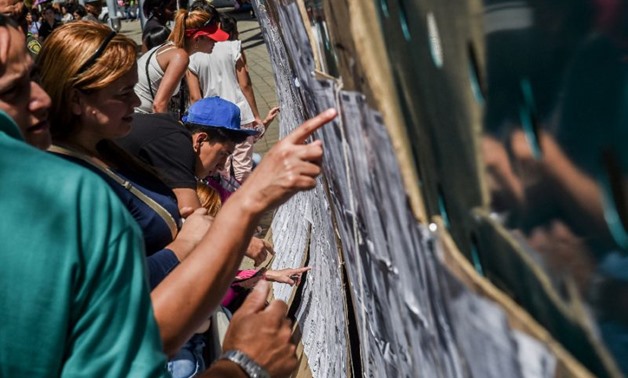
Colombian voters check the electoral rolls Sunday at a polling station in Medellin during elections to select a new Congress, with rightist candidates, bitterly opposed to the peace deal with leftist rebels, expected to do well
COLOMBIA - 12 March 2018: Colombians went to the polls Sunday to elect a new Congress with a resurgent right, bitterly opposed to a peace deal that allows leftist former rebels to participate, expected to poll strongly.
The election is set to be the calmest in half a century of conflict in Colombia, with the former rebel movement FARC spurning jungle warfare for politics, and the ELN -- the country's last active rebel group -- observing a ceasefire.
Polls opened at 8 am local time (1300 GMT), and will remain open until 4 pm (2100 GMT).
"This is the first election in half a century when we will vote in peace, without the FARC as an armed group, but as a political party," said President Juan Manuel Santos, who signed a peace deal with the FARC in November 2016.
The peace accord with the Revolutionary Armed Forces of Colombia (FARC) guarantees their new political party 10 of the 280 seats in the new Congress.
The party uses the same Spanish acronym, which now stands for the Common Alternative Revolutionary Force, and replaced its crossed-rifles insignia with a red rose.
"It's the first time in my life that I've voted and I do it for peace," said Pablo Catatumbo, a former FARC commander who is assured a senate seat.
Opinion polls give the FARC little chance of adding to its 10 free seats, following a disastrous campaign during which its rebels-turned-politicians were largely drowned out by a tide of public revulsion over crimes committed during the conflict.
Candidates were mobbed by angry crowds at rallies and the party had to cancel its public meetings.
"What is at stake for the FARC is positioning and the possibility of establishing itself with an eye to what really interests it politically: elections" for mayor and governor in 2020, said Carlos Arias Orjuela, a political consultant at Externado University.
The fledgling party suffered a fresh blow only days before the election when its leader, Rodrigo "Timochenko" Londono, pulled out of the presidential race after undergoing heart surgery.
- Right closing on victory -
With the left divided, the stage is set for hardline conservatives who oppose the agreement to win an absolute majority in Congress, and push on to win the presidential election in a few months.
Opinion polls predict a triumph for ex-president and senator Alvaro Uribe and his Centro Democratico party, along with other parties opposed to the peace agreement that has polarized the South American country.
Under the peace accord, FARC disarmed its 7,000 fighters in order to join the political process, agreed to confess to wartime crimes and pay reparations to victims.
This infuriates many Colombians, in particular the right wing, which is vowing to win the presidential election and amend the peace deal.
But much of the peace agreement has already been implemented, including the rebels disarming and demobilizing.
Analysts say a hard-right government could block the implementation of the rest of the pact, including agrarian reform and the special justice deal under which repentant rebels can avoid jail by paying reparations.
"The mere fact of not applying what has been signed would be enough for this agreement to be ineffective," said Frederic Masse, an expert on the conflict at Colombia's Externado University. "It would be a more pernicious strategy than to renegotiate."
Felipe Botero, political scientist at the University of the Andes, said resurgent conservatives could even let the laws implementing the deal lapse, to the extent that they "are never voted on or not presented" to the new Congress.
- Party primaries -
With Santos stepping down as president after two terms, a sideshow to the legislative elections is the primary elections for both main political blocs, taking place at the same time.
The first round of the presidential election is set for May 27, with the run-off planned for June 17.
Current polls show conservative Ivan Duque, a former Bogota mayor who is planning to run for Uribe's Centro Democratico party, leading the presidential race.
Duque is followed by leftist Gustavo Petro -- who is seeking to become the first left-wing president in Colombia's history -- and former Medellin mayor Sergio Fajardo, a centrist candidate.
The vote takes place against the backdrop of economic concern in Colombia, which registered 1.8 percent growth in 2017, its weakest for nearly a decade.
Neighboring Venezuelans have added new pressure, arriving en masse as they flee an economic and humanitarian crisis in their own country.
More than 36 million people are eligible to vote in the election, though traditionally abstentionism hovers around 60 percent.


Comments
Leave a Comment